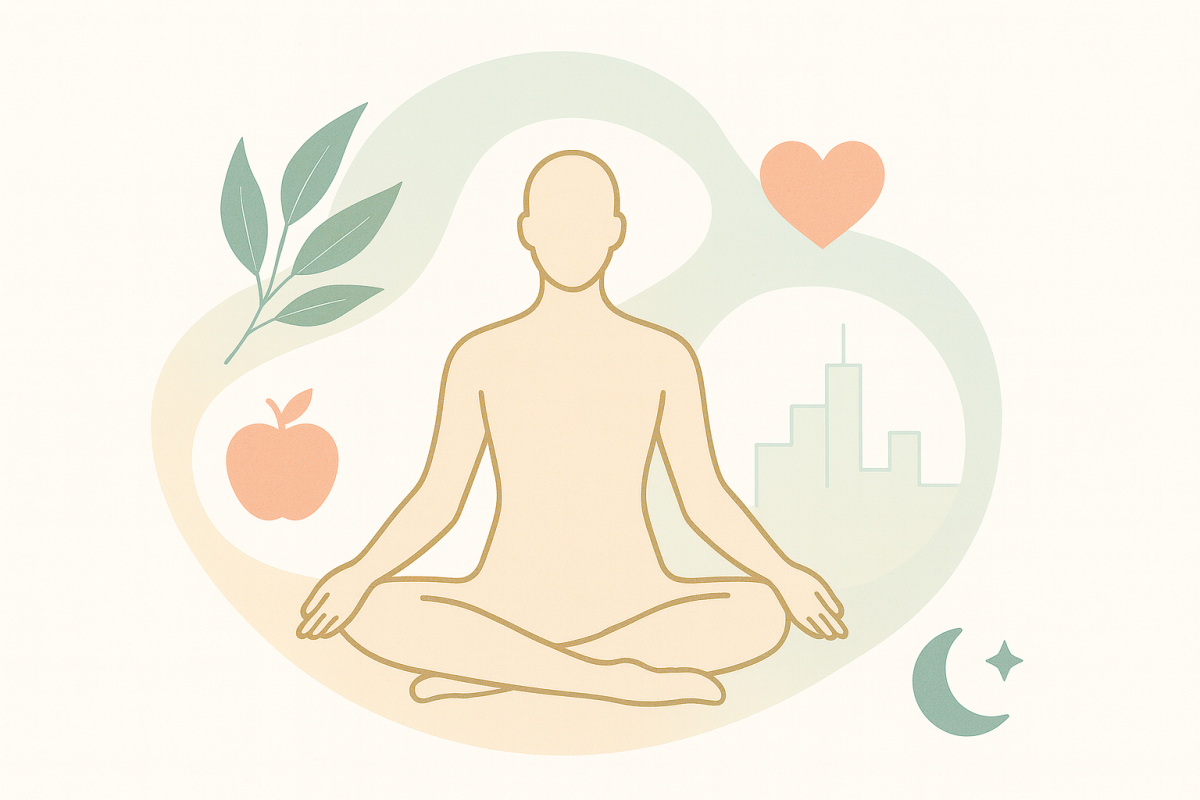Modern life often pulls us in multiple directions at once. Between work commitments, family responsibilities, and the constant connection of digital technology, finding time to pause and recover has become increasingly difficult. Many Australians are feeling the effects of this unrelenting pace, fatigue, stress, and a gradual loss of balance that impacts both physical and emotional well-being.
For people living in busy urban centres such as Melbourne, this lifestyle can take a particular toll. The pressure to stay productive and constantly available often leads to a cycle of exhaustion that rest alone cannot fix. In Victoria, many people are turning to a holistic general practitioner in Melbourne for a more comprehensive and individualised approach to health. These practitioners combine evidence-based medical care with a focus on nutrition, lifestyle, and emotional well-being, helping patients address the root causes of imbalance rather than just the symptoms. Holistic medicine looks at the person as a whole body, mind, and environment to help restore balance and promote lasting health.
Finding Balance in Modern Australian Life
Across Australia, health professionals are seeing a steady rise in stress-related conditions. Long working hours, sedentary habits, and the challenges of modern living all contribute to fatigue and low energy. Melbourne, known for its vibrant lifestyle and diverse workforce, is no exception.
It’s easy to focus on quick fixes when feeling tired or overwhelmed a stronger coffee, a supplement, or a few days off. But these short-term measures rarely address the deeper causes. Holistic medicine encourages a broader look at what’s happening in the body and mind. Rather than isolating symptoms, it asks how lifestyle, nutrition, mental health, and environment interact to influence overall wellbeing.
What Holistic Medicine Means
Holistic medicine is based on the principle that health is more than the absence of disease. It recognises that physical, emotional, and social factors are interconnected and that true healing involves addressing each of these aspects together.
Unlike conventional care, which may focus on treating a specific condition, holistic medicine aims to understand why symptoms occur. This can include exploring how diet, sleep, stress, and movement influence energy, mood, and immune function.
At a holistic GP clinic in Melbourne, patients are encouraged to take an active role in their care. Practitioners work collaboratively, combining medical science with lifestyle-based strategies that support long-term wellbeing. The goal is not just to relieve symptoms but to help the body regain balance and resilience.
The Mind–Body Connection
Modern research continues to show how closely the mind and body are linked. Emotional stress can trigger physical symptoms, and physical illness can influence mood and mental health. When this relationship is overlooked, it can create a cycle where stress fuels illness, and illness increases stress.
Holistic medicine pays close attention to this connection. It considers how hormones, the nervous system, and the immune response all interact during times of strain. By addressing mental and physical health together, it becomes possible to reduce tension, stabilise energy levels, and support recovery from fatigue or burnout.
For example, stress management techniques such as mindfulness, breathwork, and relaxation training are often integrated alongside medical or nutritional therapies to support the body’s natural healing processes.
Core Principles of Holistic Care
Holistic medicine is guided by several key principles that shape how practitioners work with patients.
- Treating root causes – Instead of suppressing symptoms, practitioners look for the underlying imbalances that contribute to illness.
- Individualised care – Every person’s health journey is unique. Holistic care is tailored to each patient’s specific needs, lifestyle, and goals.
- Patient participation – Healing is a shared process. Patients are encouraged to understand their own health and make informed choices.
- Prevention and education – Building long-term wellbeing through awareness, self-care, and early intervention.
This approach allows patients to gain a clearer understanding of their bodies and develop sustainable habits that support lifelong health.
Practical Ways Holistic Medicine Promotes Balance
Holistic medicine draws from a range of evidence-based therapies that address both mind and body. Some of the most effective methods include:
- Nutrition and gut health – Identifying nutrient deficiencies, improving digestion, and supporting a balanced diet.
- Movement and activity – Encouraging gentle, consistent physical activity to improve energy and reduce tension.
- Sleep and rest – Establishing healthy sleep patterns to restore the body’s natural rhythms.
- Stress regulation – Using mindfulness, breathing exercises, or guided relaxation to calm the nervous system.
- Emotional well-being – Recognising how relationships, work, and daily pressures affect mental health.
These strategies are often combined in a personalised plan designed to restore balance step by step. Over time, small adjustments in lifestyle can have a significant impact on how the body functions and how a person feels day to day.
Holistic Medicine in Melbourne
Victoria has a long tradition of embracing integrative approaches to health, and Melbourne continues to lead the way in holistic and functional care. Many people are turning to holistic practitioners to help manage fatigue, anxiety, and other stress-related conditions that conventional medicine alone may not fully address.
At a holistic medical clinic in Melbourne, care often includes detailed consultations that explore not only symptoms but the broader context of a person’s life, work habits, diet, emotional well-being, and environmental factors. This comprehensive perspective helps patients find solutions that align with their values and lifestyle, creating a more balanced path to health.
Integrating Holistic and Conventional Medicine
Holistic medicine does not replace conventional medical care it complements it. Many patients find that combining the two creates the best outcomes. A patient may continue regular GP visits for medical monitoring while working with a holistic practitioner on nutrition, stress management, and lifestyle adjustments.
This integrated model ensures that every aspect of health is considered. It also allows for collaboration between professionals, ensuring that treatments are safe, coordinated, and evidence-based. Conditions such as chronic fatigue, anxiety, digestive issues, and sleep disorders often respond best when both medical and holistic methods are used together.
Taking the First Step Toward Better Balance
Restoring balance begins with awareness, recognising when stress and fatigue have become part of everyday life. From there, small, deliberate changes can make a difference. Choosing nourishing foods, prioritising rest, and creating space for relaxation are simple but powerful acts of self-care.
For those ready to explore a more comprehensive approach, visiting a functional medicine clinic in Melbourne can provide guidance that looks at the full picture of health. By identifying patterns and underlying factors, practitioners can help design a plan that supports long-term balance and resilience.
Holistic medicine reminds us that health is not about perfection but about alignment, bringing the physical, mental, and emotional parts of life into harmony so we can live with greater clarity and vitality.
FAQs
Q1: What is the difference between holistic and functional medicine?
A1: Both focus on treating the whole person, but holistic medicine emphasises lifestyle and emotional balance, while functional medicine often uses advanced testing to identify biochemical or physiological imbalances.
Q2: Can holistic medicine work alongside traditional medical treatments?
A2: Yes. Holistic medicine is designed to complement conventional care. Practitioners often collaborate with GPs and specialists to ensure safe, coordinated treatment.
Q3: What types of conditions can benefit from holistic care?
A3: Common examples include fatigue, stress, anxiety, digestive issues, sleep problems, and mild hormonal imbalances. Holistic care can also support recovery and prevention.
Q4: How long does it take to see results from holistic medicine?
A4: Improvements vary depending on each person’s condition and lifestyle, but many patients notice changes in energy, sleep, and mood within a few weeks of consistent care.
Q5: Is holistic medicine evidence-based?
A5: Yes. Many holistic practices, including nutrition, mindfulness, and stress reduction, are supported by research showing benefits for both physical and mental health.
Q6: How do I find a qualified holistic GP in Melbourne?
A6: Look for practitioners who are registered medical doctors with additional training in holistic or integrative medicine. Clarendon Medical provides professional, evidence-based, holistic care in Melbourne.
Disclaimer
This information is for educational purposes only and is not a substitute for professional medical advice, diagnosis, or treatment. Always seek the guidance of a qualified healthcare provider with any questions you may have regarding your health or medical condition.



